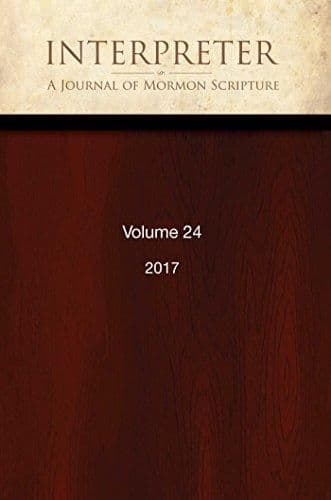Journal
“If Ye Believe on His Name”: Wordplay on the Name Samuel in Helaman 14:2, 12–13 and 3 Nephi 23:9 and the Doctrine of Christ in Samuel’s Speech

Title
“If Ye Believe on His Name”: Wordplay on the Name Samuel in Helaman 14:2, 12–13 and 3 Nephi 23:9 and the Doctrine of Christ in Samuel’s Speech
Publication Type
Journal Article
Year of Publication
2021
Authors
Bowen, Matthew L. (Primary)
Journal
Interpreter: A Journal of Latter-day Saint Faith and Scholarship
Pagination
49-76
Volume
46
Abstract
The Semitic/Hebrew name Samuel (šĕmûʾēl) most likely means “his name is El” — i.e., “his name [the name that he calls upon in worship] is El” — although it was also associated with “hearing” (šāmaʿ) God (e.g., 1 Samuel 3:9–11). In the ancient Near East, the parental hope for one thus named is that the son (and “his name”) would glorify El (a name later understood in ancient Israel to refer to God); or, like the biblical prophet Samuel, the child would hear El/God (“El is heard”). The name šĕmûʾēl thus constituted an appropriate symbol of the mission of the Son of God who “glorified the name of the Father” (Ether 12:8), was perfectly obedient to the Father in all things, and was the Prophet like Moses par excellence, whom Israel was to “hear” or “hearken” in all things (Deuteronomy 18:15; 1 Nephi 22:20; 3 Nephi 20:32). Jesus may have referred to this in a wordplay on the name Samuel when he said: “I commanded my servant Samuel, the Lamanite, that he should testify unto this people, that at the day that the Father should glorify his name in me that there were many saints who should arise from the dead” (3 Nephi 23:9). Samuel the Lamanite had particularly emphasized “believ[ing] on the name” of God’s Son in the second part of his speech (see Helaman 14:2, 12–13) in advance of the latter’s coming. Samuel thus seems to use a recurrent or thematic rhetorical wordplay on his own name as an entry point to calling the Nephites to repent and return to living the doctrine of Christ, which activates the blessings of the atonement of Jesus Christ. Mormon took great care to show that all of the signs and prophecies that Samuel gave the Nephites of Zarahemla were fulfilled at the time of Jesus’s birth, death, and resurrection as Jesus glorified the Father’s name in every particular, and found further fulfillment in some particulars during Mormon’s own life and times.
Subject Keywords
Bibliographic Citation
Terms of use
Items in the BMC Archive are made publicly available for non-commercial, private use. Inclusion within the BMC Archive does not imply endorsement. Items do not represent the official views of The Church of Jesus Christ of Latter-day Saints or of Book of Mormon Central.